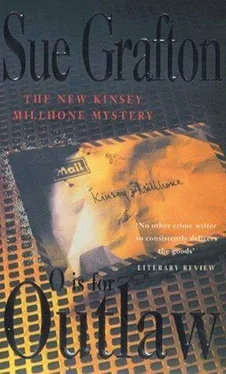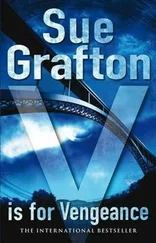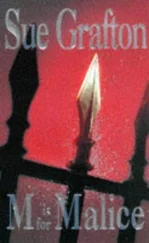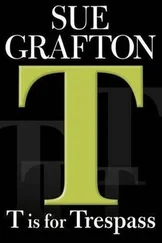Fifteen minutes later, I experienced one of those exhilarating moments of satisfaction when, sure enough, the clerk found the marriage record.
"Oh, wow. This is great. Isn't this amazing?" I said.
The clerk's look was jaded. "I'm completely stunned. "
I laughed. "Well, I like being right, especially when I'm flying by the seat of my pants."
He leaned on the counter, his chin on his hand, looking on while I took out my cards and jotted down the information embedded in the form. The license was issued on June, 1965. Assuming it was good for thirty days, the wedding must have taken place within the month. Darlene LaDestro, age twenty-two and working as a bookkeeper, was the daughter of Harold and Millicent LaDestro and resided at the address listed in the 1961 telephone book. Mark Charles Bethel, age twenty-three, occupation U.S. Army, was the son of Vernon and Shirley Bethel with an address on Trevillian Way. Neither the bride nor the groom had been previously married.
Idly, the clerk said, "You know who he is, don't you? "
I looked up at him with interest. "Who, Mark Bethel? "
"No, LaDestro."
"I don't know a thing about him. What's the story?"
"He was awarded the patent for some kind of widget used on the Mercury space flights."
"And that's how he made his money?"
"Sure. He's still famous around here. Self-taught, eccentric. He didn't even have connections to the aerospace industry. He just worked on his own. I saw a picture of him once, and he looked like a pointy-headed geek. He'd been tinkering all his life without making a dime. In hock up to here, living in a dump. Everybody wrote him off as a nut, and then he comes along and aces out McDonnell-Douglas for the rights to the thing. He died a rich man. I mean very, very rich. "
"Well, I'll be darned," I said. "What was it, the thing he patented?"
"Some doodad. Who knows? I heard it's in use to this day. The world is full of guys who design gizmos they never get credit for. LaDestro hired a patent attorney and took the big boys down."
"Incredible."
"His daughter sure lucked out. I hear she lives in California now on some fancy estate," he said. He pointed to the license. "You want a copy of that?"
"How much?"
"Two dollars for regular, five for certified."
"Regular's fine," I said.
I drove from Jefferson to Third, then hung a left on Broadway, driving east until it angled into Bardstown Road. I followed Bardstown Road through an area of town known as the Highlands. Once on Trevillian, I found the house where the Bethels had lived. The white frame house looked comfortable, not large but well maintained in a solid middle-class neighborhood, certainly superior to the one where Laddie'd grown up. I parked in front of the house, traversed the long sloping walk, and climbed the stairs to the porch. No one was home, but a simple check of the mailbox revealed that a family named Poynter now occupied the house. This was Donna Reed country: green shutters on the windows, pansies in the flower boxes, a tricycle on the sidewalk, and a dog bone lying in the yard. All the window-panes sparkled, and the shrubs were crisply trimmed. As I looked on, a lean gray cat picked her way carefully across the newly cut lawn.
I returned to the car, where I sat and studied my map. Gauging the proximity of schools in the area, I decided Mark probably attended Highland junior High and then Atherton or St. Xavier, the Catholic high school on Broadway. He might have gone to private school, I wasn't sure about that, but he struck me as the sort who'd take pride in his public school roots. Now what?
I leafed through the pages I'd assembled, letting my mind wander. I'd added a number of dots, but I still couldn't see all the lines connecting them. Duncan Oaks seemed pivotal. I sensed his presence like the hub of an enormous wheel. I could trace the hometown relationship between him and Benny Quintero. Contemporaries, two high school athletes who had played the same positions on opposing football teams, their paths had crossed years later on the bloody soil of la Drang. After that, Duncan Oaks had vanished but Quintero had survived, keeping Duncan's dog tags, his press credentials, and a snapshot. I could also tie Duncan Oaks to Laddie Bethel, born Darlene LaDestro, who'd attended high school with him. And here's where the machinations became more intricate. Laddie was now married to the attorney who'd represented my ex-husband, a suspect in Benny Quintero's beating death seven years later. If Duncan Oaks was the hub, maybe Mark Bethel was the axle driving subsequent events.
I started the car and headed back to my motel. Even without the links, a picture was forming, crude and unfocused, but one that Mickey must have seen as well. The problem was I had no proof a crime had been committed all those years ago, let alone that it had sparked consequences in the here-and-now. It simplystood to reason. Some combination of events had resulted in the killing of Benny Quintero and the shooting of Mickey Magruder. I had to fashion a story that encompassed all the players and made sense of their fates. If life is a play, then there's a logical explanation, an underlying tale that pulls the whole of it together, however clouded it first appears.
Before my plane the next morning, I put in a call to Porter Yount, asking if he could lay his hands on the columns Duncan Oaks had written before he went to Vietnam. Much hemming and hawing, but he said he'd see what he could do. I gave him my address and a great big telephone kiss, telling him to take care, I'd be in touch with him.
The flight home was uneventful, though it took up most of the day: Louisville to Tulsa, Tulsa to Santa Fe, Santa Fe to Los Angeles, where I shuttled to the motel, picked up my VW, and drove the ninety minutes home. Between the actual hours in the air, the wait between planes, and the commute at the end, I arrived in Santa Teresa at 4:30 P.M. I was feeling irritable: tired, hungry, flat-haired, oily-faced. I was also dehydrated from all the nuts I'd eaten in lieu of meals that day. I had to slap myself around some to keep from whining out loud.
The minute I got home, I sat down at my desk and removed Mark Bethel's curriculum vitae from the bottom drawer where I'd tucked it Saturday. On the front page, he'd listed his date and place of birth as Dayton, Ohio, August 1, 1945. He'd graduated with a BA from the University of Kentucky in 1965. Under military experience, he listed U.S. Army, modestly omitting mention of his Purple Heart. I'd call Judy in the morning, my palate smeared with peanut butter, pretending to be a journalist so I could pin that down. If Mark had been at la Drang, I'd be one step closer to completing the picture, which was almost done.
I stripped, showered, and shampooed my hair. I brushed my teeth, got dressed again, and trotted down the spiral stairs.
My first thought was to have a conversation with Carlin Duffy, conveying a condensed version of what I'd learned in Louisville, though at this point I still didn't know quite what to make of it. I'd restrict myself to the facts, leaving out the speculations and suppositions I was still playing with. The contact was largely a courtesy on my part. He hadn't hired me. He wasn't paying me and I didn't feel I owed him an explanation. I was hoping, however, that he'd have something to contribute, some piece of the puzzle he hadn't thought to share. More to the point, I remembered Duffy's rage and frustration the night he'd shown up at Mickey's. I didn't relish a repeat performance and this was my way of protecting myself. Duffy's brother had died, and he had his stake in the matter.
I headed out to the nursery, where I found a parking slot in front of the gardening center. I prayed Duffy was on the premises instead of at the Honky-Tonk. The bar was open at this hour, but I didn't dare go back. I thought I'd better keep my distance in case Tim and Scottie realized I was the one who'd blown the whistle on them. It was close to five-thirty, still lightout, and I made my way easily along the tree-lined paths. I could see the roofline of the shed at the rear of the lot, and I mentally marked my route. There was no direct passageway, and I angled back and forth between the crated trees.
Читать дальше












